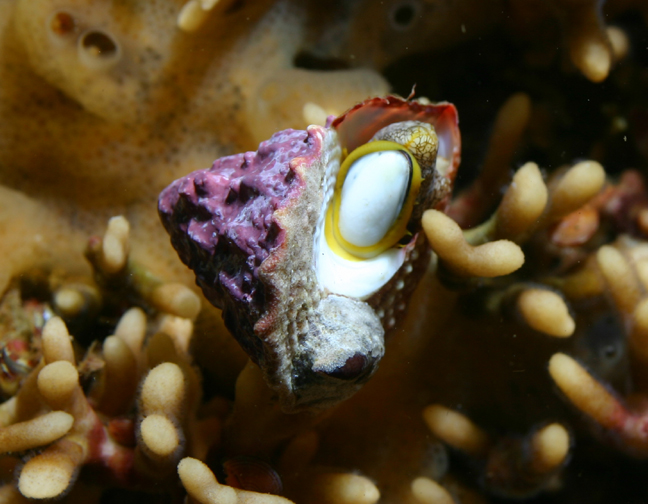More power, more colors, more sizes, more flexibility. The next generation of Panorama and Stunner LED’s from Ecoxotic simply gives you more. The new Panorama Pro units are a completely new design of the popular LED lights, and offer more power (19watts vs. 12watts), linkability, 5 color choices, and a really cool remote control RGB unit. Read More »
Category Archives: Reef Aquariums
Feed SubscriptionSnail Mortality – A Helping Hand May Save A Life
 “Why is that snail just sitting there? Is it dead? Why do they keep dying?”
“Why is that snail just sitting there? Is it dead? Why do they keep dying?”
Common questions with a lot of possible answers – Water quality, mineral or vitamin difficiency, starvation, predation – but often the solution can be quite simple…it fell down and couldn’t get up. Snails crawl around all the time, but falling off of a surface and ending up with their shell on the sand can be a death sentence.
Most snails aren’t adapted to environments where there they may get flipped upside-down (like falling off the straight sides of an aquarium). They are from environments where they are either not climbing at all (like sand flats) or where if they do fall, they either roll until they are right-side-up again or fall where they can reach another surface and right themselves. Being upside-down for short periods of time won’t kill the snails, but it does leave them vulnerable to predation from tankmates, and they can’t feed or do any other normal snail things. Some snails can flip themselves over like acrobats, but others may need a hand if they get stuck. Read More »
Electrolysis and “Salt Creep” in Aquariums

The Importance of Water Changes In Aquarium Maintenance
Routine water changes are the most basic, most necessary, and most overlooked acts of tank maintenance. Most aquarists know they should do water changes, but not everyone does or even knows how to do it the right way. How much and how often are highly debated topics among aquarists no matter what kind of tanks they keep.
Why should we do water changes?
Removing water from the aquarium and replacing it with new, “clean” water removes waste and organics that are dissolved in the water. It also helps to remove any chemical treatments or medications when the treatment is complete. Dissolved organics contribute to Nitrate and Phosphate build-up that aquarists try so hard to control. These compounds can affect the health of your livestock directly and can promote algae and cyanobacteria growth, making your tank unsightly. Changing the water also helps to replenish minerals and other trace elements. This can be especially important in tanks with corals and crustaceans (crabs and shrimp, both freshwater and saltwater) that use these minerals to form their skeleton or exoskeleton. Corals and other saltwater invertebrates can use up minerals fairly quickly in a closed environment, and replacing old, depleted water with fresh saltwater adds these minerals back into the tank. Read More »
Understanding the Role of Magnesium in a Reef Aquarium
 Often overlooked, Magnesium plays a critical role in the chemical and biological processes in the Marine aquarium. Magnesium is a major element (as opposed to a trace element) and is the third most common element in seawater behind only Sodium and Chloride. Magnesium is an essential element to all organisms for biological functions, and is especially important to organisms that are skeleton building, as Magnesium is a key component of aragonite. Far too often, we find aquarists who are struggling to figure out what is causing issues in their reef aquarium, and Magnesium deficiencies end up being at fault. It is impossible to maintain ideal Calcium and Carbonate levels in salt water without maintaining Magnesium levels as well. Many folks struggle with keeping their Alkalinity and Calcium to appropriate levels in their marine aquariums, yet never test their Magnesium levels. At levels below natural sea water concentrations of Magnesium (1280-1350 ppm), Calcium and Carbonates will precipitate out with each other in inorganic forms, and dosing either will not achieve the proper results in a low Magnesium environment. Read More »
Often overlooked, Magnesium plays a critical role in the chemical and biological processes in the Marine aquarium. Magnesium is a major element (as opposed to a trace element) and is the third most common element in seawater behind only Sodium and Chloride. Magnesium is an essential element to all organisms for biological functions, and is especially important to organisms that are skeleton building, as Magnesium is a key component of aragonite. Far too often, we find aquarists who are struggling to figure out what is causing issues in their reef aquarium, and Magnesium deficiencies end up being at fault. It is impossible to maintain ideal Calcium and Carbonate levels in salt water without maintaining Magnesium levels as well. Many folks struggle with keeping their Alkalinity and Calcium to appropriate levels in their marine aquariums, yet never test their Magnesium levels. At levels below natural sea water concentrations of Magnesium (1280-1350 ppm), Calcium and Carbonates will precipitate out with each other in inorganic forms, and dosing either will not achieve the proper results in a low Magnesium environment. Read More »
 That Fish Blog – Aquarium Advice and Information
That Fish Blog – Aquarium Advice and Information
